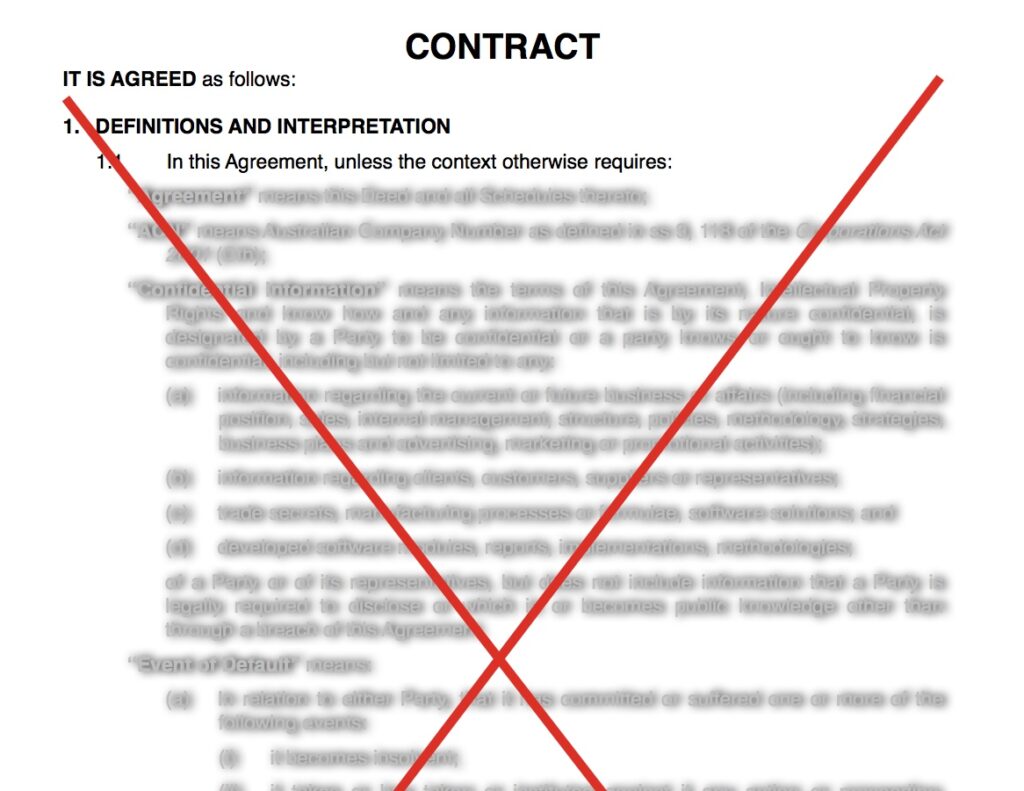In November 2016 the protections under the unfair term provisions of the Australian Consumer Law, previously only available to consumers, were extended to apply to small businesses.
In a decision handed down on 9 August 2017, Deputy President I. Lulham of the Victorian Civil and Administrative Tribunal (VCAT) held that the contract term in question was unfair and therefore void under Australian Consumer Law because it allowed the respondent to supply the exact opposite of what it contracted to supply. The respondent was ordered to repay the money paid pursuant to the contract and to reimburse the filing fee on the VCAT application.
The Respondent was a promoter of public speaking events. The Applicant booked to attend a seminar to be given by a Mr Green from the UK in Melbourne in January 2017.
The Applicant made the booking by completing in handwriting a printed “order form” including ticking a box next to the words “Terms and conditions: I have read and accepted the terms and conditions overleaf”, and signing and dating the form.
The Applicant paid the full fee of $3,995.00.
In December 2016 Mr Green sent the Applicant an email, saying that he had to “postpone the Melbourne event to a later date to be confirmed in 2017”. He offered to allow the Applicant to attend the same course in Sydney on an alternate date including a rebate. The Applicant rejected this offer because the dates were not suitable.
The Applicant sought a refund and the Respondent refused seeking to rely on the following arguments:
- the Applicant had declared that he had read and understood the terms and conditions;
- that the Melbourne seminar was postponed and not cancelled; and
- clause 3 of the terms and conditions stated: “We may change the Speakers, the Hours, the Dates and/or the Location of the Seminar Services for any reason by notifying you in writing of the change and detailing substitute Speakers, Seminar Hours, Dates and/or Location and:
(a) we shall have no liability to you; and
(b) you shall make no claim against us (including for a refund), in respect of the same.”
His Honour rejected the first two arguments because clause 3 was an unfair term, and therefore void. The fact that the Applicant declared that he had read and understood the term did not add anything to the matter. He noted that the Applicant might have been comfortable signing the contract because he knew clause 3 was void. Further, objectively the event was cancelled not postponed.
His Honour stated, “Clause 3 exemplifies pure drafting overreach, because it purports to empower the Respondent to supply the opposite of what it contracted to supply.” He noted that “any number of comedic examples would come to mind were clause 3 to have any effect”.
He stated that whilst the clause would undoubtedly be unenforceable at common law, the Australian Consumer Law makes the position even clearer.
It is irrelevant that Mr Konynenburgh (and not the Applicant Company) was going to attend the seminar and that his company, the Applicant, paid the fee because section 23 of the Australian Consumer Law has been extended to apply to both “consumer contracts” and “small business contracts”.
S23(1) – (3) provide that a term of a consumer contract or small business contract is void if the term is unfair and the contract is a standard form contract. His Honour held that there is no doubt that the contract in this case was a standard form contract because s27 creates a rebuttable presumption that a contract is a standard form contract, and the Respondent did not present any evidence to the contrary.
He held that the contract in question was a small business contract pursuant to S23(4) which defines a small business contract as one where:
(a) the contract is for the supply of goods or services, or the sale or grant of an interest in land; and
(b) at the time the contract is entered into, at least one party is a business that employs fewer than 20 persons; and
(c) either of the following applies:
(i) the upfront price payable under the contract does not exceed $300,000.00; or
(ii) the contract has a duration of more than 12 months and the upfront price payable under the contract does not exceed $1,000,000.00.
Pursuant to s24(1) essentially a term is “unfair” if three elements exist: it causes a significant imbalance in the parties’ rights and obligations; it is not reasonably necessary to protect the legitimate interests of the party who would be advantaged by the term; and it would cause significant detriment to a party.
His Honour found that there was no doubt that the term was unfair. The purported rights reserved to the Respondent render the obvious imbalance in the party’s rights and obligations far more than “significant”. They really purport to deprive the Applicant of any rights at all. The reservation of rights is not reasonably necessary to protect the Respondent’s rights, and they would cause a significant detriment to the Applicant, because they would allow the Respondent to keep the Applicant’s money without supplying anything of value to the Applicant.
S24(2) enables the Tribunal to consider the extent to which the term is “transparent” (as defined in s24(4)) when considering whether a term is unfair. Whilst his Honour found that clause 3 was transparent being: expressed in plain language, legible, presented clearly, and readily available to read, it is quite possible for a transparent clause to be unfair.
S250 of the ACL empowers the Tribunal to declare a term to be an unfair term and his Honour held it appropriate for the Tribunal to do so in this case.
If you believe an unfair contract term applies to you, contact our friendly and professional team at Peter Speakman & Co on 9822 8611 for more information.




